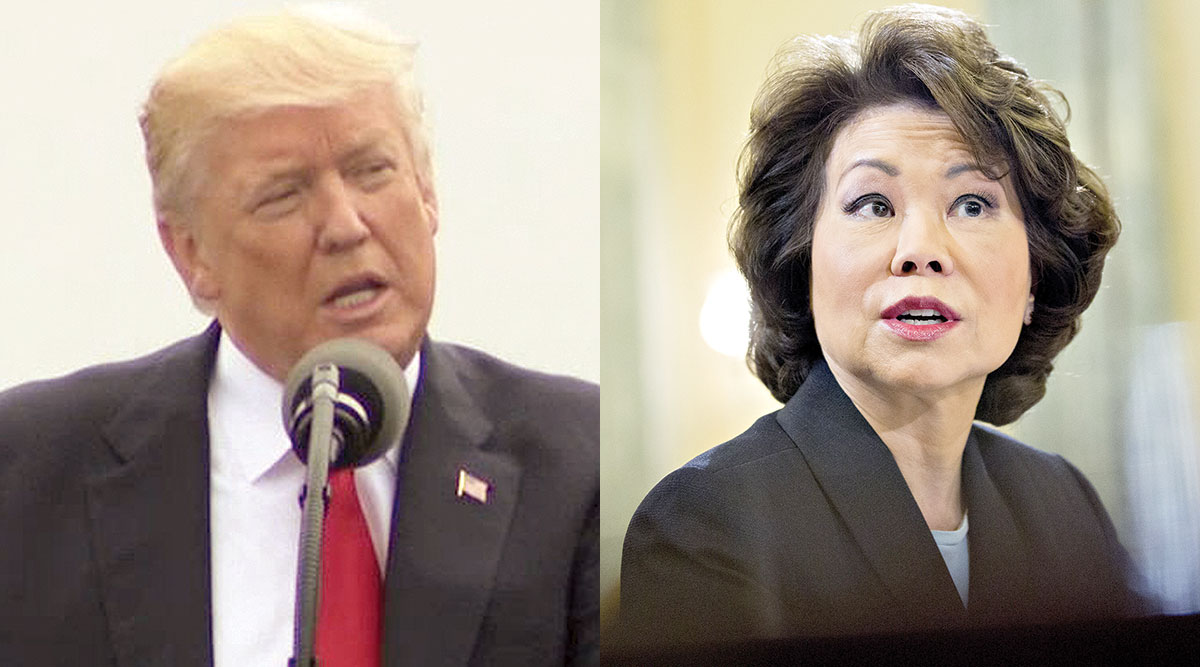Senior Reporter
Trump, Chao Make Pitches to Revitalize Infrastructure

This story appears in the June 12 print edition of Transport Topics.
With support from Congress, critical freight routes and structurally deficient bridges would be repaired and modernized under the Trump administration’s $1 trillion, 10-year infrastructure funding plan, the president and his lead transportation adviser argued last week.
During separate events President Donald Trump, in Cincinnati, and Transportation Secretary Elaine Chao, in Washington, vowed that now was the time to fix the nation’s crumbling infrastructure. And Chao said that details of the infrastructure plan could come as soon as next month.
In the middle of the administration’s self-described “infrastructure week,” Trump called for bipartisan backing of a plan that would largely rely on private sector backing to pay for new roadways, pipelines, and bridges.
“We will create the first-class infrastructure our country and our people deserve,” the president said standing along the bank of the Ohio River on June 7.
He did not offer updates for his proposal for $200 billion in federal funds. That portion of his plan would be used to incentivize $800 billion in private sector investments to pay for the construction projects.
Also, Trump took aim at the permitting process for construction projects, arguing that environmental reviews contribute to myriad delays. “We’re getting rid of the regulations,” Trump said.
He also expressed concern with his predecessor’s signature health care law and called Democrats in the House and Senate obstructionists for pushing back on much of his agenda.
Senate Minority Leader Chuck Schumer (D-N.Y.), who proposed a federally funded infrastructure blueprint in January, disagreed with Trump’s dismissal of Democrats.
“My colleagues and I are eager to work with him on a real bill. We’re ready. We’d like the White House to just pick up the phone and call us and say, ‘How can we work together on this.’ So far, nothing,” Schumer told reporters June 6.
American Trucking Associations Chairman Kevin Burch, president of Jet Express Inc. in Dayton, Ohio, attended Trump’s address and acknowledged a need to promote a fuel tax increase to fund infrastructure projects and promote highway safety. He also emphasized that Trump’s push toward job creation and enhancing freight mobility are priorities the trucking industry supports. “We should be making these projects because they produce jobs, they produce more efficient operations, and, my personal opinion, it’s a safety issue,” Burch told Transport Topics on June 8. “Sure, we all would like to ride on better roads, make sure the waterways are OK, but safety has to play a role in there.”
Prior to the president’s speech, Chao told the Senate Commerce Committee the administration’s vision of a transportation network would be unveiled sometime between July and September. “We hope to have the legislative language, depending on the congressional schedule, probably third quarter of this year,” Chao said.
Public-private partnerships via tolls and the streamlining of the permitting process for construction projects would be the legislation’s centerpieces, she added.
The secretary stressed that funding reductions for infrastructure grants would be made up in other programs.
Like Trump, Chao offered no new clues about the administration’s infrastructure vision. Even though the Senate hearing focused on aviation systems, Chao also did not update lawmakers about freight grants she said last month would be awarded soon.
Both events unfolded in the shadow of Senate scrutiny over Trump’s firing of former FBI Director James Comey as well as hearings related to ongoing probes into whether Trump campaign officials or associates colluded with Russian officials to influence the 2016 election.
The White House’s infrastructure blueprint released in May proposed “allowing the private sector to construct, operate and maintain interstate rest areas, which are often overburdened and inadequately maintained” and “putting infrastructure permitting into the hands of responsible state and local officials where appropriate.”
As for regulations, the U.S. Department of Transportation is asking companies for feedback on how to expedite permits for infrastructure projects and to identify burdensome requirements.
“The Department of Transportation recognizes that there are regulatory and administrative burdens that impede transportation infrastructure projects. The department also recognizes that the stakeholders who deliver projects have direct experience with those burdens,” according to a notice in the Federal Register. “Public and private project sponsors, engineering and construction professionals, related organizations and other stakeholders encounter and overcome these obstacles to project delivery on a daily basis.”
At the Commerce committee hearing, Sen. Richard Blumenthal (D-Conn.) expressed concern over the White House’s proposal to privatize an aspect of the country’s aviation system as well as reducing funding for passenger rail services and eliminating Obama-era grants for regional infrastructure projects. Other Democrats have expressed skepticism over reforms to the permitting process and the impetus to privatize corridors.
In January, Senate Democrats unveiled a $1 trillion infrastructure funding proposal that has been ignored by the Republican leader, Sen. Mitch McConnell (R-Ky.).
“The private sector is not a magic solution here. More toll roads and toll bridges may make money for wealthy investors on Wall Street, but they do not help rural America,” said Sen. Patrick Leahy (D-Vt.) on June 6, adding, “I can’t emphasize that strongly enough — the president’s proposals are a nonstarter for rural America.”
A consortium of environmental groups led by the Sierra Club criticized Trump, insisting that a proposal that would benefit investors would overlook public interests.
“We will stop Trump’s attempt to privatize our roads, put up new tolls and give our money to his Wall Street billionaire friends and foreign investors,” the environmentalists said.
The Alliance for Toll-Free Interstates, made up of various freight associations, took aim at the administration’s fixation with public-private partnerships.
“To be clear, when President Trump spoke today about ‘private dollars’ in infrastructure, specifically relating to surface transportation, he is talking about tolls,” alliance spokeswoman Stephanie Kane said. “Tolls are the worst funding mechanism available and are a highly inefficient use of funds. Tolls should be removed from any discussion of responsibly fixing our country’s ailing roads and bridges.”

